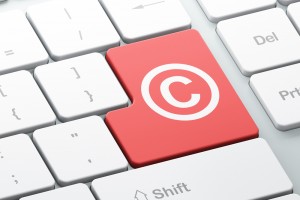Blogging is a widely used method for everyday people to share their writing, projects, thoughts, and ideas. It is so incredibly easy to get a blog up and going that it can almost seem as if there are no restrictions or limitations on those who call themselves bloggers. This common misconception can lead to a blogger making an innocent mistake and landing themselves in hot water. The following is some information that you may want to keep in mind when creating posts for your blog on the World Wide Web.
 www.shutterstock.com
www.shutterstock.com
Copyright Laws
Copyright laws are in place in order to extend protection to someone who creates an original work whether it be:
- A written work
- A photo or image
- A video or audio clip
Many people are aware that by presenting someone else’s work as their own they are committing plagiarism. This is why you must take certain steps in order to be sure that the work is attributed to its original source or creator. By simply posting something on your blog that is not your own and not attributing or crediting its source or creator you may unknowingly commit an act of plagiarism. In order to avoid any legal issues stemming form a mistake always be sure that work is credited and linked to the original source when applicable.
What about fair use laws?
Fair use laws can often be misunderstood. The laws of fair use allow the republishing of material provided it is for commentary or educational purpose. In order to proactively avoid any issues, use only selected information and always provide a link and source credit to the original material that is the basis for your post.
In the case of images, permission for use needs to be acquired before posting. Many bloggers however are using sites that allow a collection of images that come with different laws of use. These sites are good because they let you know what is expected of you if you choose to use the photo, right from the start. There are different use license that are applicable to photo and image content. These are:
- Rights-Managed–This usually means that a fee is paid per use.
- Royalty Free–These images can be free or require a one-time fee that allows you to use the image as many times as you would like. They often require a credit or link of some sort that is outlined in the agreement of use.
Creative commons is a rising star among the many people who need photos and images for content posted on the internet. It has many images that may be used for free.
Libel
Libel is a very serious charge. You may be labelled with this accusation if you say or post something untrue that damages the reputation of another person or business. These lawsuits can also be quite costly. This is a very good reason why you should not post things out of anger and why you should choose your words very carefully.
Trademark Infringement
This can be avoided easily. All you need to do is to make sure that no names or logos on your site give the false presumption that you have a relationship of some kind with a brand or trademark that you are not affiliated with.
Violating these laws can be a curse to your reputation and your financial well-being. Find more information and know exactly what legalities are associated with running your blog. Blogs that do not have a good amount of original content and even those that violate laws can be removed from search engines or there could be other serious ramifications. The internet can often give a false sense of security, but it remains true that it is still governed by laws in order to protect everyone.
Lilly
Latest posts by Lilly (see all)
- The Aging Population and the Future of Social Security - January 14, 2014
- How To Manage Your Finances Post-Divorce - December 9, 2013
- Health In The Workplace: What To Do If A Disability Renders You Unable To Work? - November 21, 2013
